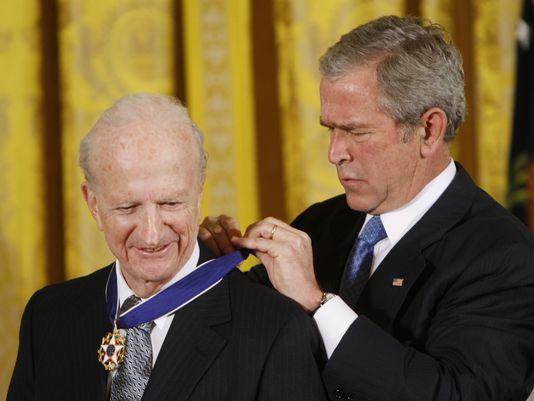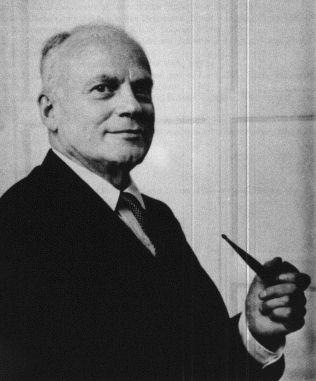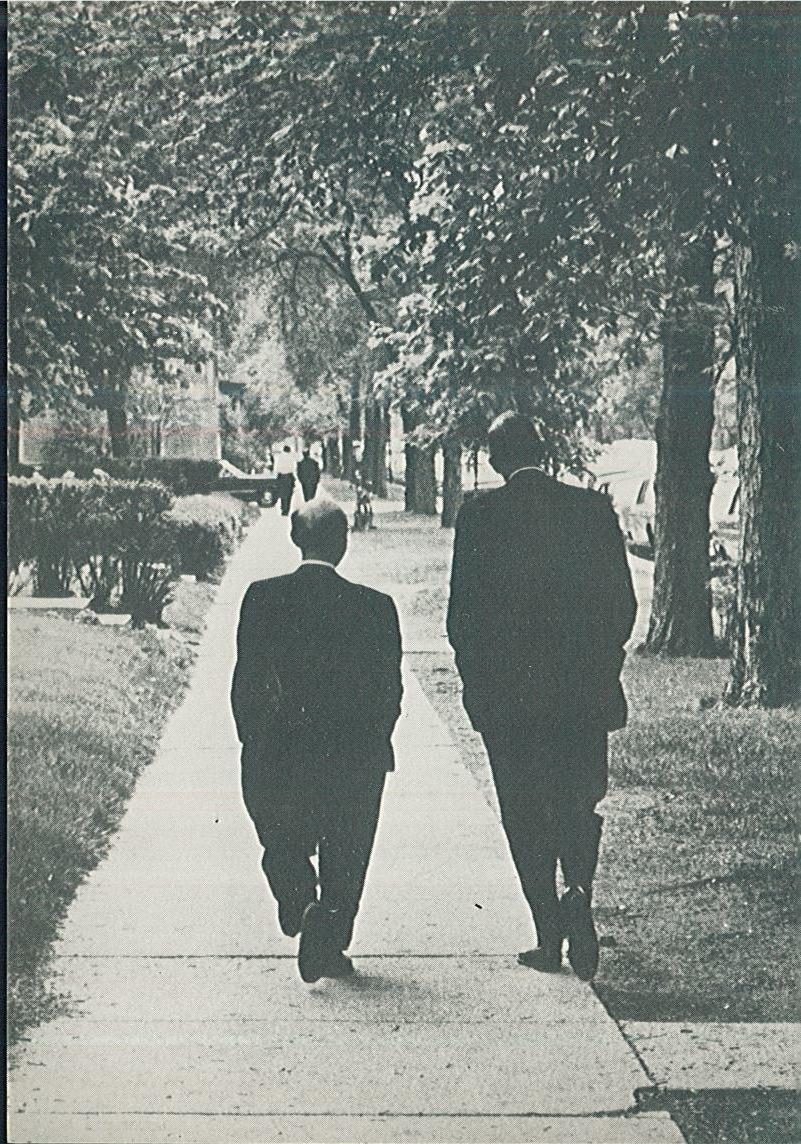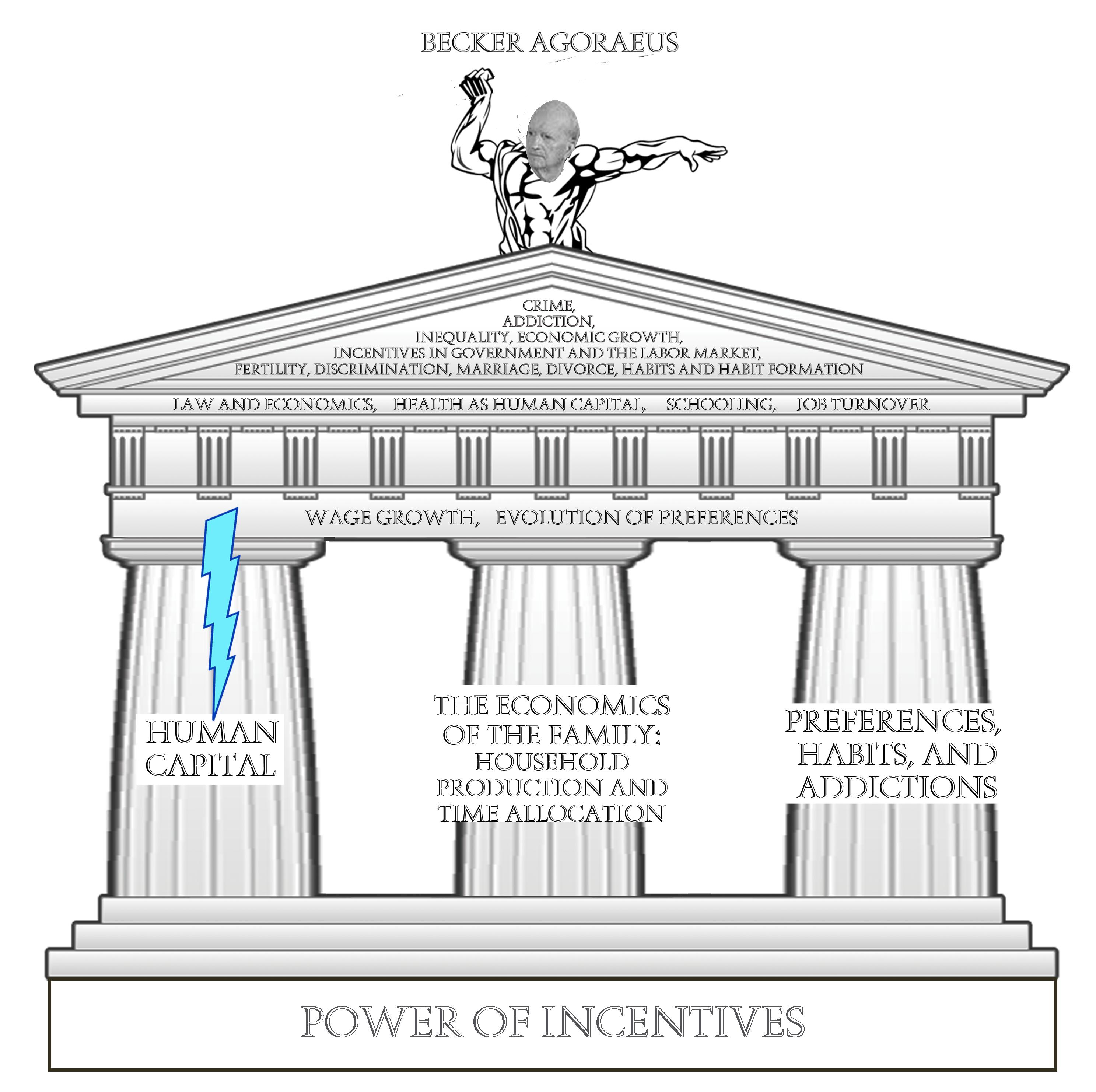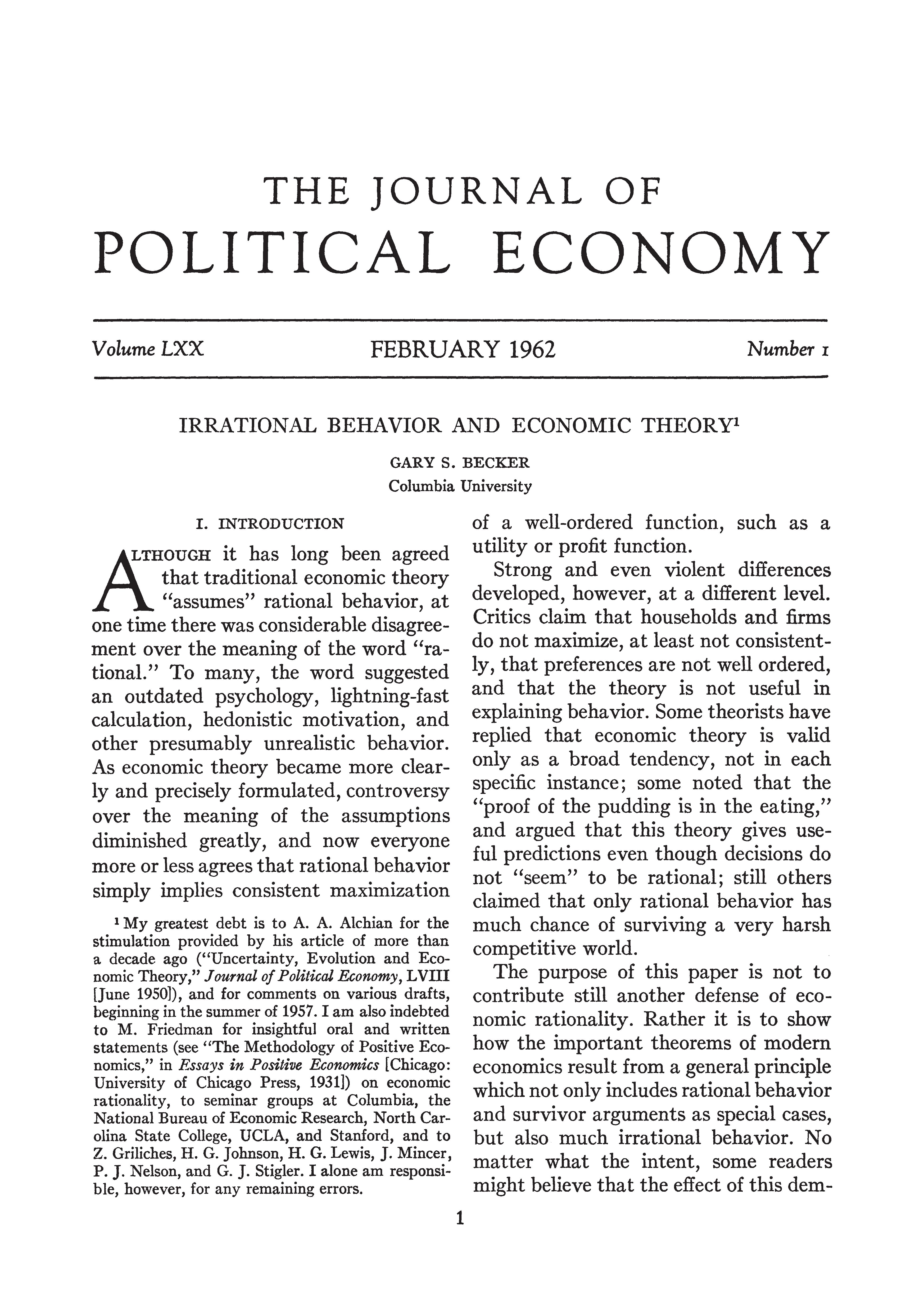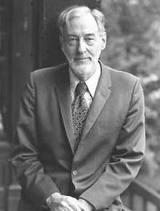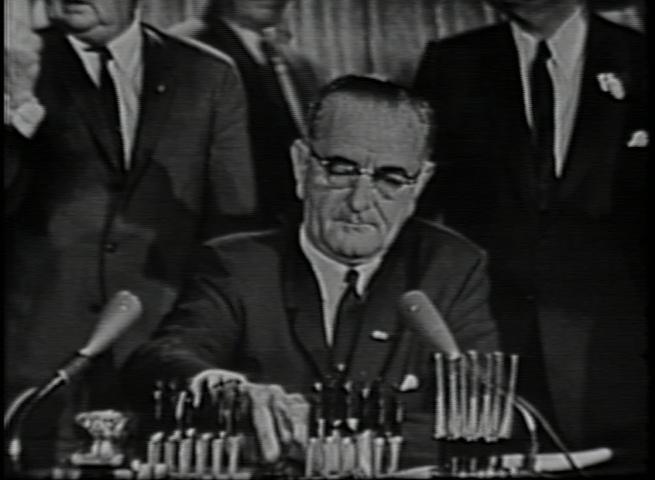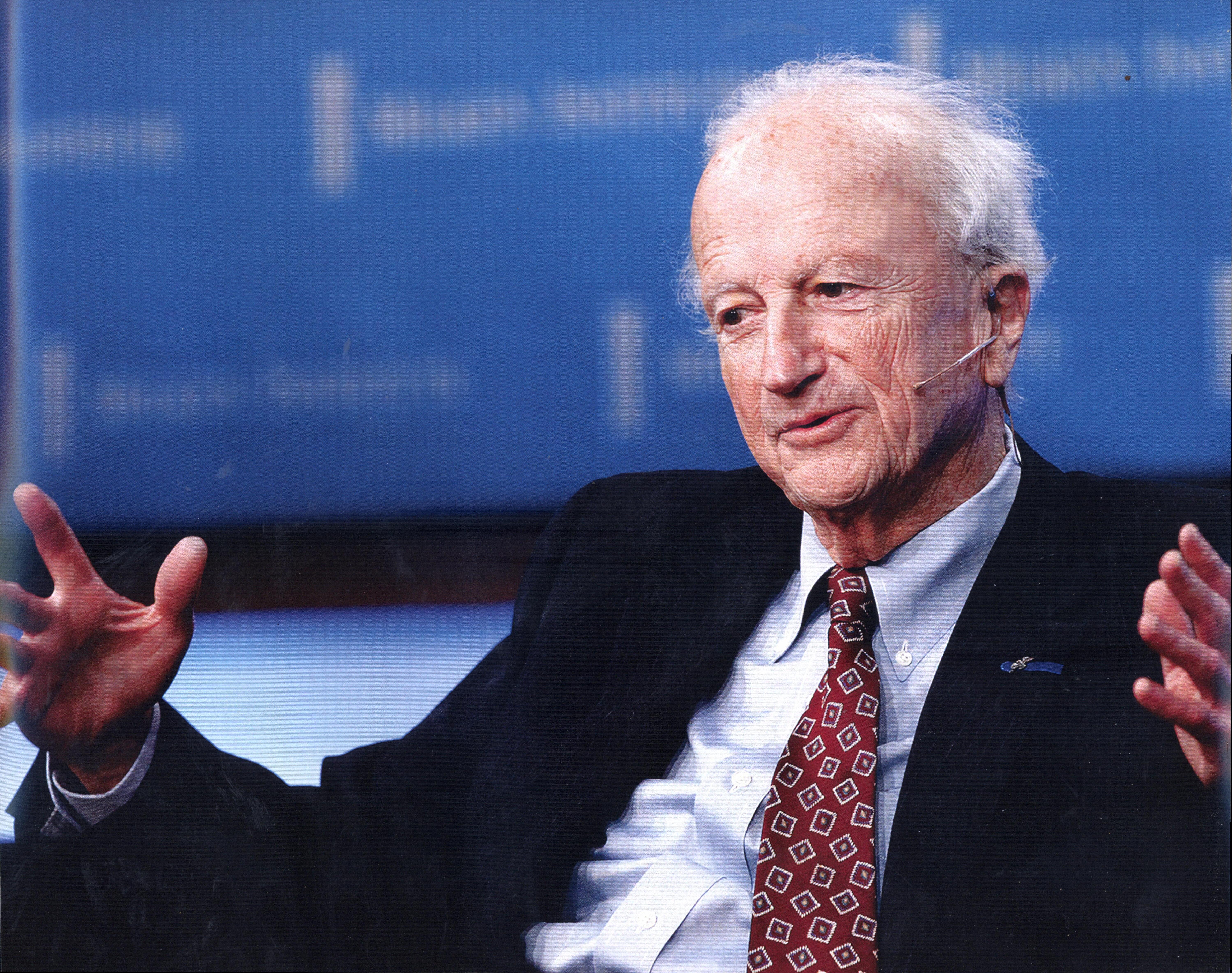JamesJ.Heckman
TheUniversityofChicago
ACelebrationoftheLifeandWorkofGaryS.Becker
TheUniversityofChicago
October31,2014
Thisdraft,November6,20142:00pm
Date:Friday,October31,2014,11:30am-12:30pm
EventTitle:ACelebrationoftheLifeandWorkofGaryS.Becker
Host:UniversityofChicago
Location:MandelHall,ReynoldsClub,5706SouthUniversityAvenue
PresentationTitle:TheImpactofGaryBecker’sWork
Format:Presentation
Length:1hour
Audiencebackground:Approx.500registrants
Thecompositionoftheaudienceiscomprisedof50%Universityof Chicagofacultyandstudents(approximatelyn=180).About10%of the180arestudentsandanother10%arenon-academics.
Theaudiencecompositionwillbesimilaratboth.TheMandelHall audiencewillbeslightlybroader(likelymorestudents)
JamesJ.Heckman
TheUniversityofChicago
ACelebrationoftheLifeandWorkofGaryS.Becker
TheUniversityofChicago
October31,2014
Thisdraft,November6,20142:00pm
Becker’sContributions Impactsofhiswork TodayIhavebeengivenaformidabletask—tosummarizeina shortperiodoftimethemultipleimpactsofGaryBecker’swork.
Formidabletaskformanyreasons:
(a) GaryBeckerleftamassive,tightlyinterconnectedbodyofwork. –Notaneasytasktosummarizeallofhiscontributionsandtheir developmentinanhour–evenjustthemajorcontributions.
(b) GaryBeckerhadmanyinterestsandrangedwidelyanddeeply acrossmanyfieldswithinandbeyondeconomics.Eachofushere todayhashis/herfavoriteGaryBeckercontributionsandknow thembest.Inevitably,whateverIsaycanonlybeapartialand incompleteaccountofhisworkasacreativescholarwhoreshaped socialscience,andwhohashadandwillcontinuetohavean impactoneconomicpolicy.Coveringtheentirerangeofhiswork, Iaminevitablygoingtoomitsomeimportantcontributions.I amboundtooffendandIapologizeinadvancefordoingso.
Howdoyoumeasuretheimpactofsuchacreativescholar?
• Onewaytomeasuretheimpactofhisworkistolookaround youandappreciatethehighqualityofthepeopleassembledhere todaytohonorhim.
• Amoretraditionalwaytodiscusstheworkofadistinguished scholaristolisthisexternalrecognitionsandhishonors.For Beckerthisisaneasybuttime-consumingtask–youallknow thathewasaNobelPrizewinner,aMedalofSciencerecipient andarecipientofthePresidentialMedalofFreedom.Hewas honoredbymanyacademiesandorganizationsaroundtheworld.
BeckerReceivingNobelPrize(1992)
• Andthesearejustafewofhismanyhonors.
• Athirdmeasureisthe AccoladesofTeachersandColleagues
“Beckeristhebest studentIeverhad .” –referenceletteronBecker’s applicationtoChicago,1951
• Viner–AmajorfigureinChicagoeconomicswholaterinlife wenttoPrincetonandtaughtBeckerasanundergrad.
• Thiswashighpraise.
• Vinerhadtaughtmanyleadingeconomists(Friedman,Stigler, Samuelson).
JacobViner
“Beckerhasabrilliant,analytical mind;greatoriginality;knowledge ofthehistoryofeconomicthought andrespectforitsimportance;a realfeelingfortheinterrelationshipsbetweeneconomicandpoliticalissues;andaprofoundunderstandingofboththeoperationofa pricesystemanditsimportanceas aprotectionofindividualliberty.” (1953)
MiltonFriedman
• ThecharacteristicsdescribedbyFriedmanweretrueofGary Beckeroverhislifetime.
• Writingaboutthesametime,thechairofhisPh.D.committee, andhimselfadistinguishedandpioneeringeconomistwhowrote animportantpaperwithBecker–ofwhichthereismorelater–
“Itishardtowritetoyouabout Mr.Beckerwithoutsounding overenthusiastic.Heisanexceedinglyintelligentandimaginativeyoungmanandcertainly, Ithink,willbecomereallyoutstandingintheeconomicsprofession.Heishonestinallmatters,hasthehighestcharacter, andIamconfident,isexceedinglytrustworthy.Irecommend himtoyouwithoutanyreservations. ”
• Traitsofcharacterthatlastedalifetime
H.GreggLewis
• Itisusefultoaskhowhisteachersviewedhim50yearslater.
• 50yearslater,Friedmanonlystrengthenedhispraise
MiltonFriedman
“GaryBeckerwasthemostinfluentialsocialscientistofthe pasthalfcentury.” –MiltonFriedman,2001 CitationCount? • Acitationcountisanothertraditionalmeasure.Beckerwas(and remains)oneofthemosthighlycitedeconomistsofthelasthalf century.Evenindeath,citationstohisworkarehigh.Butthis toomissesthesubstanceoftheman.
• Allsuchsummariesareinevitablysuperficial.Theyfocusonthe exteriorandmissthecontentandtruecontributionofhiswork anditstrueimpact.
• Instead,todayIwillattempttoassesshisworkusing GaryBecker’sownstandards.
“It[economics]isjudgedultimatelyby howwellithelpsusunderstandthe world,andhowwellwecanhelpimproveit.”–GaryBecker
ConsiderHisContributionsto: A. Thought–theworldofideas–the corpus ofthebody ofeconomicsandsocialsciencemoregenerally.
B. ContributionstoPublicPolicy.
• ForBecker,andfortheChicagoofhisera,thetwoworldswere notdistinct.Economicswasallaboutunderstandingtheworld andasheoftensaid—quotingfromMiltonFriedman—itwasnot agameplayedonlyforthepleasureofcleverpeopletoshowhow smarttheyare.
• AsFriedmannoted,evenasagraduatestudent,GaryBeckerhad deepknowledgeoftheinterplaybetweeneconomicandpolitical issues.
• Beckerwasonrecorddeploringaneconomicsdetachedfromreal worldproblems,andhisworkaddressedrealworldproblems.
WillAlsoDiscuss
C. HisimpactonthevitalityandcontinuityofbotheconomicsatChicagoandthe“ChicagoSchool”–two differentbuthighlyrelatedentities.
D. Howhemaintainedandextendedthistraditionand createdanewbodyofideasthatenrichedthistradition.
E. GaryBeckerasanexampleofhowtodocreativeeconomicsthatchangestheworld.
ABriefBiographyofBecker • Beckerwasabrilliantstudentandscholar.Borntomiddle-class parents,raisedinBrooklyn,andeducatedinNYCpublicschools, Princeton,andChicago,Beckerdevelopedrapidly.
• HegraduatedPrincetonin3yearswhereheworkedwithJacob VinerandcoauthoredapaperwithWilliamBaumolthatshowed adeepunderstandingofthehistoryofthoughtregardingclassical monetarytheory.
• Thiswasatraitthatcharacterizedallhiswork.Throughout hislifetime,hegroundedhispapersinthehistoryofeconomic thought.Heplacedhisworkincontextandpresentedastatementofthecontinuityandoriginalityofhiswork.
BeckeratPrinceton
BeckerfinishedhisPh.D.thesisin3years,stayedonthefacultyat Chicagofor3years,andthenwentofftoColumbiaandtheNBER, thenheadquarteredinNewYork.
BeckerasaGradStudentatChicago
Independence EventhoughBeckerwasofferedapositionatChicago,heleftto makehisownmark–tobehisownman–andshowedearlyonthe independenceandpluckthatcarriedthroughhislifetime.
BeckeratColumbia AtColumbia,hewasrapidlypromotedtotenureandachaired professorship,andalongwithJacobMincer,createdthelegendary ColumbiaLaborEconomicsWorkshopofwhichthereismorelater.
Manyofhisstudentsareheretoday.Ijoinedthisworkshopinthe aftermathofGaryBeckerandwasimpressedbythepassion,enthusiasm,andcreativityoftheparticipants.Theirsenseofsolidarityin defenseofBeckeragainstgeneralhostilitytowardhimatthetimein theeconomicsprofessionsuggestedtomethatthiswaswhatearly Christianswerelike–exceptthatmostoftheparticipantsinthe workshopwereJewish!
• MovedBacktoChicagoatage40
• UniversityProfessor1970-2014
• Countingallofhistimeasagraduatestudent,assistantprofessor,anduniversityprofessor,hespent50yearsatChicago.
• AlthoughhewasnotChicago-born,hewasChicago-bred.
BeckeronLeaveatChicago(1969)
HeirapparenttoleadershipofeconomicsatChicagoSchool–Iconic photo
TheLongandShortoftheChicagoSchool:Early1970s
Friedman&Stigler • WaitinginthewingsatChicago
Chicago1972Poster(After“TheSchoolofAthens”byRaphael)
• ByRogerVaughn,agraduatestudentatthattime
• Explainwhoisinthepicture(AgnewandNixon)
• Pictureshows5membersoffacultywhowouldeventuallywin NobelPrizes
• Hiswaitinthewingswasnotlong
• QuotingfromShakespeare’s JuliusCaesar : “YonCassiushas aleanandhungrylook.Hethinkstoomuch.Suchmenare dangerous.”
Placehimincontext • GaryBeckercameofageinthe‘50sand‘60s,atatimewhen Keynesianmodelswereintheforefrontofprofessionalthinking ineconomics.
• IncentivesandpriceswerelargelyignoredoutsideofChicagoand itscircle.
• Chicagotradition(backtoSimons,Knight,Viner,andlater Friedman,Schultz,Stigler)emphasizedthestrongroleofincentivesandtheneedtorespectthemindevisingpoliciesand understandingbehavior.
• TheKeynesianmultiplierpromisedafreelunchforblackbox reasons.
• Kennedytaxcut(1962)viewedasatriumph.
• AgreatexampleofKeynesianthinkingistheBrookingsmodel oftheeconomy(1965).Itwasacomplexmonsterofamodel withmanysectors.Itbarelyconsideredthelabormarketorthe householdandgenerallylackedanyroleforprices.
• Laborsupplynotstudied.
• Demographyasafieldlackedacoherentdiscussionofincentives.
Becker
Developments in Economic Theory
BeckerinContext:RanAgainsttheGrain DevelopmentsinEconomics1950–2014 Human Capital Irrational behavior
Economics of Discrimination Babies as Consumer Durables
First round of game theory; decision theory; uncertainty; operations research
Developments in Econometrics
1950 1960 1970
Time use & Household Productivity Crime
General equilibrium Optimal growth
Family Economics Law and Economics Incentive models Economic Analysis of Tastes
Moral hazardAdverse selection models of incentives Game theory
AddictionFamily models
Dynamic Fertility Growth and Spillovers
Auction models; Incentive compatibility; Contract theory
Era of Rational Expectations and Micro-based Macroeconomics Macroeconomics (Brookings Model)
Simultaneous equation models; computers enter; macro econometrics (Keynesian)
Keynesianism Dominant Era
Refinement of multiple regression measurement error (Theil, Zellner, Goldberger)
Collection & analysis of microdata
Developments in Data Analysis
Policy Issues
Computation; national accounts
Development of large scale macro models
Microeconometrics (Discrete Choice; Selection Bias; Accounting for individual; heterogeneity)
Computational Economics
Panel data models Experiments
Information on individual actors Growth
Panel surveys
Experiments (Lab and Field)
War on Poverty (Discrimination, schooling, inequality)
Coleman Report (Importance of Family)
Crime and Urban Riots (Koerner Comission)
Growth of Welfare and Single Headed Families (Moynihan Report)
Growth in worldwide inequality
2000 Habits, Preferences, Health
Data
• Thefieldofeconomicswasverylimitedinscope.
• Andeveninthefieldsstudied,roleofincentivesneglected.
• Intheeconomicsheenteredinthe1950s,representativeagent modelswerestandardineconomicsinthelimitedpartofeconomicsthatconsideredincentives.
• Heterogeneityanddiversitywereignored.
• AnyadequateaccountofBecker’smanycontributionstoknowledgehastocharthisremarkableevolutionofthought.
• Weallevolveinourthinking.
• ButwhatisnotableaboutGaryBeckerwashowasheevolved inhisthinking,hetookthefieldofeconomicsandlatermany othersocialscienceswithhimandcreatedabodyofworkthat nowshapesthinkingaboutmanysocialissues.
• BeckerhadaMidastouch.
• WhenBeckertouchedasubject,itbecameasuitabletopicfor economiststostudy.
• Hewouldwalkonforbiddengroundsandturnthemintopathwaysofknowledgeforthosewhofollowed.
Examples Manypossibleexamples:todayIwillfocuson4andtrytoestablish interconnection
(a) Economicsofdiscrimination
(b) Humancapital–Beckergaveustoolsandevidenceonstructure thatwasacoherenttheoryofthegrowthofearnings,human capital(personalandfirm),economicsofslavery,inequality,job turnover,growthaccounting.
(c) Theeconomicsofthefamily:fertility,marriage,householddivisionoflabor,andintergenerationalmobility
(d) Thestudyofpreferencesfascinatedhimthroughouthislifetime. Itisinterestingtoseehowhisviewsonpreferenceschanged.
(e) Threeofthesetopicswereacornerstoneofhislife’swork.
(f) Onallofthesetopicshecontributedtoeconomicsciencebydevelopingframeworksfordatacollectionandanalysisthathadan enormousimpactonempiricalsocialscience.
Power of Incentives • BeckerAgoraeusreferstoBeckerandhisinfluenceonthemarket (Agora).
• Atthe foundation ofallofhisworkandtheChicagoeconomicsthatprecededhimwasabeliefinthepowerofincentives –broadlydefinedandnotjustmonetaryincentivesbackedup byempiricalevidencesupportingthisbelief.
http://youtu.be/gfEaoDuhBYA Becker’sApproachtoEconomicsandSocialScience
(a) Usedacoresetoforganizingprinciplesandapplied themeverywhere
• Gottotheessenceofproblems
• Gaveinsightfulprototypicalexamplesthatilluminatedsubjectsstudied–examples:
(i) RottenKidTheorem
(ii) MaritalSorting(bestwithbest)
(iii) Marketdiscriminationsetbymarginaltransaction
Hisorganizingprinciples
• Peoplepursueself-interest(broadlydefinedandincreasingly broadlydefinedoverhislifetime)
• Stablepreferences
• Equilibriuminmarket
• HefollowedtheChicagotraditionbydoingMarshallianpartial equilibriumanalyseswithinmarketswhereactorsonagentsand theirinteractionswerereadilyidentified.
(b) AppliedFriedman’smethodologyofpositiveeconomics:success oftheoryjudgednotinpredictingoutcomesononedatasetbut initspowertoexplainotherdataandpredictadditionalphenomena.
• Lookedat multipleimplications ofhistheories(human capital)ondifferentdatasetsandnewproblems
• Judgedatheorybytherangeofitsimplications
• Notonefactoronestudy
(c) Likemostscientistshehatedtautological“explanations”like “tastechange”orpreferenceshocksasexplanations(technical change,preferenceshocks)
• Alwayssoughttounderstandphenomenafromdeeperorganizingprinciples
(d) Alwaysstayedrootedineconomics.
• Carefullydelineatedhisintellectualrootsandhowhedepartedfromthem.
• Wentintootherfieldsbutwasneverabsorbedbythemand heshowedhoweconomicswouldinformthequestionsstudied there.
• Indoingsoheemboldenedmanyotherstoventureontonew grounds.
(e) Hadaperspectiverooteddeeplyinthehistoryofeconomicthought.
• Inmanyofhispapers,hewastalkingnotjusttohispeers,but togenerationspast.Hewasspeakingtopastgreateconomists andupdatingandexpandingtheirwork.
• Hisfirstpaper–onClassicalMonetaryTheorywithBaumol –publishedatage22–wasdoctrinalinnature.
• Heneverlostthatperspectivethroughouthislifetime.
Becker’sCharacteristics • Highlyoriginal,constantlyextendedthefrontier.(Didnotwrite bookreviewsorpolemics).Hecreatednewtoolsandapplied them.
• Hiscareershowedcontinuitiesbutalwaysgrowth.
• Constantlysoughtnewchallenges.
• Eachstepledtonewideasandfurthersteps.
• Helistenedandlearnedfromcriticismsandfromfailures.
• Showedopennesstotheideasofothers–evenhisharshestcritics –persistenceandresilience.
• Hedidsoinafirmbutpoliteway.Setastandardofgentility andrespect.Stoodoutinaharshplace(ChicagoEconomics) thatcouldoftenbebluntandcutting.
• Hedevelopedessentialideasineachofthetopicsheaddressed andgaveprototypical,insightfulexamplesthatmotivatedthe literature.
• Createdadeeplyinterconnectedsystemofideasthathecontinuedtoperfecttotheveryendofhislife.
• Hislife’sworkunfoldslikeasymphony–newthemes introducedandblendedwiththeoldthemes—but thesymphonygrewinrichnessandstrength.
StayingtheCourse • Beckerwasnotadilettante.
• Eventhoughhewasaquickstudy,focusedonproblemsfor monthsandyearsandkeptrefininghisthinkingandchallenging it.
• Likeothergreatscientists,thesetopicsneverlefthismindeven afterheprovisionallysolvedthemandwasacclaimedfordoing sobecauseheknewthatallanswerstoallquestionsareonly provisionalhypotheses.
VenturedintoUnchartedTerritory • Oftenthetopicshechosewerehighlycontroversial.
• Theywereofflimitstoeconomistswhenheinitiallyventured intothem.
• Hewasviewedasacrackpotforstudyingthem.Initiallypaid theprice(e.g.,babiesasconsumerdurables).
• Marriage,fertility,education,formationofpreferences,drugaddiction,salesofbodyorgans.
• Heperseveredagainsttremendoushostility–
(a) StoryofhisjobmarketinterviewatMITwhereSamuelson andSolowopenlyderidedhimforhisworkondiscrimination.
(b) Samuelson’sdescriptionofhiswork.
PraisingEasterlin’srelativeincomehypothesis,Samuelsongoes ontocriticizeBeckerandT.W.Schultz...
“‘TheEasterlintheoryisallthemorevaluableforitsscarcity amongeconomictheories,standingoutinwelcomerelieffromthe rathersterileverbalizationsbywhicheconomistshavetendedto describefertilitydecisionsintermsofthejargonofindifference curves,therebytendingtointimidatenon-economistswhohave notmis-spenttheiryouthinmasteringtheintricaciesofmodern utilitytheory.”’ –PaulSamuelson(1978)
• HecitesSchultzandBeckerinafootnote.
(FromRobertPollak, GaryBecker’sContributionstoFamilyand HouseholdEconomics,2002)
• Hereactedwithdignitytotheseandotherattemptsatridicule (e.g.,AlanBlinder’sEconomicsofBrushingTeeth.)
• Sincerity wasatraitheexudedandvaluedinothers.
• Beckerhadcontemptforscholarsmoreinterestedinpublishing papersthanunderstandingproblems.
• Hehadcontemptforcareeristswhosoughtheadlinesandnot substance(“Top5”journals)andlookedtomakeasplashwith journalists.
• Thisinfactwasacharacteristicof ChicagoEconomics.
• TedSchultz,anotherNobelPrizewinnerandBecker’scolleague formanyyears,describedBeckerandZviGrilichesaspeoplewho “stayedwithaproblem.”
OneMeasure:BeforeandAfterBecker –Aseriesofeventstudies.
• Whydidhechoosethistopic?Hadhepersonallyexperienced discrimination?Perhaps.
• HewasamongthefirstcohortofJewish-AmericansgrantedadmissionandacceptanceinIvyLeague.
• Chicagobenefitedfromanti-semitisminwelcomingtopstudents andfacultyofJewishoriginatatimewhenthiswasrare.
• Whateverthemotivation,histhesiswasaremarkablefeat.
RecastDiscussionoftheProblem,WhichUptoThat PointWastheSoleProvinceofPsychologistsandSociologists:
(GordonAllport:NatureofDiscrimination)
• Theclaimmadebymanywasthatcapitalistsbenefitedfrom discrimination.
• Byexploitingminorities,majoritiesbenefited.
• Beckerexaminedthisnotionindepth.
KeyIdeasinBecker’sworkonDiscrimination
(a) Showedtheinterplayofpreferencesandmarkets.
(b) Keyidea– distributionoftastes fordiscriminationamong firms
• Tworadicalnotions:
– Utilitymaximizingfirms and heterogeneity among firmsinpreferences.
– Bothfeatureswereradicalinnovationsatthetime.
(c) Minoritiessortedtofirmsthathadlessdiscriminatorytastes.
(d) DefinedMarketandIndividualDiscriminationinan EmpiricallyOperationalWay —Pricepeoplepayfortheirtastes. Marketdiscriminationwasthepricepaidforbeingaminority. Thediscountarosefromthemarginaltransactioninthemarket.
(e) Contrasted MarketDiscrimination with IndividualDiscrimination
Highlyrelevantforauditpairstudiestodaythatsampletheaveragetransaction,notthetransactionat themargin.
(f) InapplicationstoracialdiscriminationintheU.S.,explainedhow greaternumbersinsomeregionsledBlackstodealwithmore discriminatoryindividuals(atmargintheygetlowerwages)
(g) Showedwhichgroupsbenefitedandwhichlostfromdiscrimination.Thegreatbenefitsoftradeandthelikelycostsofwithdrawal ofgroupsfromsociety,e.g.,asproposedbytheMarcusGarvey movement.Whitecapitalistslose;whiteworkerswin;blackcapitalistslose;blackworkerswin.
(h) Fellowemployeediscriminationandconsumerdiscrimination. Distinguishedsegregationfromdiscrimination(Iffellowemployeesdonotlikeeachother,oftensortbyrace).
(i) Interpretedawiderangeoffactswiththemodel.Didoriginal empiricalworkonthetimeseriesofthestatusofblacks.(A featureofhisworkthatwasinthespiritofFriedman’sworkon themethodologyofpositiveeconomicswhichwasbeingwritten whilehewasagraduatestudent.)
ContributionsoftheBook: (1) Pioneeredutilitymaximizingmodeloffirm(priortoWilliamson andtheCarnegieBehavioralSchoolandBaumolandlaterwork).
(2) Introducedheterogeneouspreferencesandmarketsortingand theirimplications.
(3) Createdaframeworkforthinkingaboutdiscrimination—implemented andtested(Landes;Ashenfelter;CharlesandGuryan)
(4) Did notthen lookattheoriginsofpreferences.
(5) Showedhowdiscrimination could persistwithsufficientlyinelasticsupplyofentrepreneurswhilehighlyoriginalwasnotoneof thepillarsofhislaterwork.
(6) Whileenoughtomakethereputationofanyone,it’saminor achievementcomparedtohislaterwork.
(7) Hisframeworkfortaste-baseddiscriminationremainsthestandardtoday.
HumanCapitalLecture • Bythemiddleofthe20thcentury–U.S.hadgreatlyexpanded itseducationalsystem.
• Skilledworkforcesemerging.
• Yeteconomicswasslowtorecognizethistrend.
• Humancapital–skillsembodiedinpeople.
• NotiongoesbackineconomicstoWilliamPettyin17thcentury.
• AdamSmithmentionsimportanceofacquiredskillsin Wealth ofNations (evenhadtheviewthatpeoplewerefundamentally equalexceptfortheskillstheyacquired).
• AlfredMarshallhadabriefdiscussionoftheimportanceofhumancapital(andhestressedthatthegreatestpartwasdueto theinfluenceofthemother)
• Lotka;Kuznets(Lotkaestimatedthevalueofalife).
• PreviousworkbyFriedmanandKuznetsdevelopedrudiments oftheidea;computedratesofreturntodifferentlevelsofeducation(occupations).Introducednotionofgeneralandspecific. (Portabilityofcapitalacrossdifferentfirmsandenvironments.)
ClassicalViewofDistributionofIncome • Threefactors– functionaldistribution ofincome Land,labor(unskilled)andcapital
• Inthislimitedview,onlycapitalwasanacquiredfactor,although landmightbeimproved.
• Ignoredtheevidencethatskilledlaboristhegreatestpartofa modernnation’swealthandsourceofproductivity
• Leftunanswered–Whydidtheeconomygrow? Exogenoustechnicalprogress(mannafromheaven)
T.W.Schultzview–technicalprogresswasmainlydueto increasesinstockofhumanskills(duetoeducationtraining, health)
Becker ButBecker created themodernfieldandshowedthefullrangeof applicationsofthetheoryaseveracknowledgingthepreviouswork butthenunifyingitinauniqueway.
• A unified theoryofhumancapital(skills) (education,onthejobtraining,broadenedtohealthandother capitals)
• Unifiedphenomenaacrossmultipledomains(labormarket,wage differentials,choiceofandreturnstoeducation,jobturnoverand theoryofquitsandlayoffs,frameworkforgrowthaccounting, inequality,wages,LeontiefParadoxintrade.)[Capitalabundant countrylikeU.S.exportedlaborintensivegoods–noparadox atall–humancapitalwas“labor”;U.S.washumancapital intensive.]
• Developedtheeconomicsofinvestment (Ratesofreturn)
• Explainedrisingwageprofiles–costsincurredearlyandpayoffs later.Roleoflifecyclewagegrowth.
• Examinedbothmicroandmacrodeterminantsofratesof“return”
FrameworksforMeasuringRatesofReturn “MincerEquation” • InitiallyusedIRR
• Developedasimplermethodin BeckerandChiswick(1966)
• ExpandedandextensivelyappliedinMincer(1974)
ρi:“rateofreturntoschoolingforperson i.”
• Abilitybias
• Askedaboldpolicyquestion– “Isthereunderinvestment oroverinvestmentinhumancapital?”“Shouldsocietysubsidizeschoolingandifso,byhowmuch?”
• Questionstillunansweredtoday.
• Addressedmanyrelevantpolicyissues.
ImplicationsforFirms • Implicationforfirminvestmentstrategies–Firmdemand–workersinvestedinbyfirms.Explainturnoverpatternsandwage growth.
• Worker-jobturnover(Jovanovic)/Theoryofquitsandlayoffs
• Explainturnoverpatternsandwagegrowth
• “Holdup”problemsarisingfromfirm-specific/worker-specific investments
Inequality • Personaldistributionofearnings.
• Skillsandskillpremium–adrivingforceininequality–apoint stillnotwellunderstood(e.g.,Piketty2014)
• Pikettylargelyfocusesoncapital
• Examinedsourcesofdifferencesinratesofreturnacrosspeople
• Howtoaddressinequality? (Supplyofskills)
• Basisforunderstandingrisingwageinequalityandunderstandingthatsomeformsofinequalitycanbebeneficial.
• Why?Becausetheypromoteacquisitionofskills.
• ExampleofwagesincommunistChinainthe1970s.
• Streetsweepersandnuclearphysicistsearnedthesame.
• Skillshortagesrampant.
• Trueofmanysocieties.
ChoiceofEducation (a) Choiceofeducationandprovisionoftraining
(b) Latermergedhisinterestinschoolingwithfamily–roleoffamily inproducingschooling
BeckerwasJustBeginning
• Thisworkwouldhavebeenenoughtomakethereputationof anyone.
• Hepublishedfirsteditionatage34.
• Buttherewaslotsmoreonhisplate.
EBSCOPublishing:eBookCollection(EBSCOhost)-printedon10/24/20144:16PMviaUNIVOFCHICAGO AN:282766;Becker,GaryS..;ATreatiseontheFamily Account:s8989984
EvolutionofBecker: InitiallyStudiedFertilityandBranchedOuttoStudy theFullLifeCycle BeforeBecker: Malthusiantheory:Income ↑ Population ↑ untiloverpopulationsets inanddrivesdownwages.
• AfterBecker amuchricherunderstandingofeconomicsoffertility.
• Greatexampleofhisevolutionanddeterminationtocreatea satisfactory,internallyconsistenttheory.Hepersistedinbeing curiousaboutthetopictotheendofhislife.
• Uptotheend,hewasveryenthusiasticabouttheAsianFamily InitiativeofBFIwhichwillexaminecausesandconsequencesof decliningfertilityallaroundAsia.
• 1960paper–stressedincomeeffects(+).(Childrenanormal good.)
• Buttheevidencegenerallyshowedanegativecorrelationbetween FertilityandFamilyincome.
• Explainedhownegative estimated incomeeffectwhichwasobservedcouldarise.(Butonlyasanomittedvariable–people withhigherincomehadgreatercontraceptiveknowledge.)
• Washarshlycriticizedbymanywhorejectedthenotionthat babieswerelikeconsumerdurables.
• AmorevaluablecriticismfromJamesDuesenberrywhocriticizedBeckerfornotrecognizinghowtheconsumptionofchildrentoeachotherandtoparents’consumptionarelinkedin partbecauseofsocialnormsandbecauseofaltruism.
• Beckerabsorbedthecriticismandeventuallyrespondedtoit, andincorporateditintohiswork.
Mincer • Mincer(1962,1963) –valueoftime(opportunitycostof timeofwomen).(Whyaspriceoftime ↑,womenmighthave fewerchildrenandworkmore).
BeckerTeachingHouseholdProductionModel By1965,organizedtheseideasin TheoryofAllocationofTime
(a) TheoryofInputs (Childaderiveddemand) Inputs–mother’stime
(b) Organizedthinkingaboutthehouseholdandhomeproduction
(i) Stimulatedworkoncollectingnewdataonhouseholdproduction
(ii) Avarietyofnonmarketactivities–health,fertility,brushing teeth,etc.(Surveysoftimeuse)
(c) Quantity-QualityTradeoff (Becker&Lewis)–(Again,tools werethere,e.g.,Theil,1955,Restudies)
(i) AdelayedbutthoughtfulresponsetoDuesenberryconsumption
(ii) Duesenberrylinkedchildqualitytoparentalconsumption standard
(iii) Becker-Lewiscreatedlinkofqualitytochildrenandparents standardsandlaterliteratureislinked
• Thisworkexplainshow,underreasonableconditions,asincome ↑,parentssubstitutequalityforquantity.
• Asparentsconsumptionrosethecostofchildrenrose!
• Thistogetherwiththeriseofpriceoffemaletimeexplainsdecline infertilitywithdevelopment.
• Highlyrelevant–usedtoexplaindecliningfertilityalloverAsia.
• Why,evenifChinarelaxestheonechildpolicy,itsfertilitywill notrisebymuch.
HouseholdFormationandDissolution • Naturalextensionofhisworkonfertility
• OutgrowthofworkwithMincer
JPE–BreathedlifeintoKoopmans&Beckmann(1957)onassignmentproblems
(a) MarriageMarket(1973)–(Again,simpleprototypicalexamplethatwaseasilyunderstoodandhadapowerfuleffecton thefield)
(i) Sortingandmatching(backtoathemeestablishedinthe Economicsof“Discrimination”)
(ii) Bestwithbest–Activeareaofresearch–Linkedupwith allocationmechanismmodels
(iii) Implicationsforchilddevelopmentandrisinginequality
(iv) Howincentivesforbeingsingleandinotheractivities wouldaffectchoicesofmarriage–tomarryatall;tastes
(v) Analysisofnofaultdivorce.
(vi) Usedanalysisofspecificcapital.
(b) Socialinteractions(simpleexample);thisalsotakesintoaccounthisworkonpreferences.
(i) Howhouseholdsinternalizeinteractionsamongmembers “RottenKidTheorem”andIntroductionofAltruism
(ii) RottenKidTheorem:underspecialcasesarottenkid whocouldonlyexpressrottennessinasinglegood,or moregenerallytransferrableutility,wouldhavenoeffects onthedistributionsandfamilyinternalizesthefulleffects.
(c) Simpleexample:ledtoahugeliteratureaboutitslimitations (d) Hegraciouslyacceptedvalidcriticism.
• Incentivesaffectfamilies.
(i) Barropapers:expandchildquality–altruismandeffectsof fertilityontheinterestrate Howtheinterestrateaffectsfertility
(ii) Becker,MurphyandTamurashowedhowendogenousfertilityandaltruismchangedthenatureoftheOLGmodel
(iii) Createdanewmodeloffertilityandgrowthchalleningthe Malthusianscheme
– Choiceoffertilitychangesrateoftimepreferencewith development;thewageofwomenriseswithdevelopment andwithhumancapitalaccumulations.(Substitutequalityforquantity).
– Discountratedeclines
– Thisfuelsforthequalityandlowersdiscountrate Aseconomicgrowthproceedsandchildquality ↑,familysize ↓,andhumancapitalperperson ↑ andtheeconomyresponds withlowerfertilityandhigherlevelsofhumancapital.
(iv) Discountrateusedbyaltruisticfamiliesdependsonfertility choices
(v) Multiplesteadystates
(vi) Importanceofinitialconditions
ContinuingInfluencetoThisDay
Activeareaofresearchtothisday– Browning,Chiappori,and Weiss(2014)
• Continuestobeabiginfluenceonmacro(hispresidentialaddress shapedthis)
• WehavemovedwellbeyondtheBrookingsmodel
(1996)
• GaryBeckerhadalifetimeinterestintheroleofpreferencesand tastesinmotivatingeconomiclifeandexplainingphenomenon.
• Consistentlyoverhislifetimeherejected“taste-based ”explanationsofphenomenawhenadifferenttasteorchangeintastesis invokedtoexplainthem.
• Buthisthinkingchangedovertimeandagainonthistopiche broughttheeconomicsprofessionandalotofothersocialsciences alongwithhim.
• Inhisworkondiscrimination,heintroducedthenotionofthe utilitymaximizingmodelofthefirm.
• Inhisworkonfertility,heusedstandardpreferences(e.g.,his earlyworkonfertility)
• Earlyon,madeadeepinsight–didnotneedpreferencesto getsomebasiclawsofeconomics
• Openly rejectedinvocationofchangesinpreferences asexplanationsofchangesineconomicvariablesinhisworkwith Stigler(1977)
• Developedasystematicanalysisof habituation,addiction, andpreferencechangebyintroducingstocksofcapital(hasa growingneuroscientificbasis)
• EvolutionofPreferences: survivalargument(aspeciesargument;notforanindividual)
IrrationalBehavior:(1962) • Thispaperishighlyrelevanttoday.
• Thisworkisverytimelyaswespeak
• Neoclassicaleconomicshascomeunderattack
• Journalists—evensometrusteesofthisuniversity—paintastraw manofeconomicsasbasedonhyperrationality,perfectforesight, andfrictionlesseconomicsastherequirementofeconomics,and rejectneoclassical
• Tothispopularmindset,certainversionsofbehavioraleconomics withtheirquirksinpreferencesaretheperfectantidote
• Oftentautologicalexplanations
RoleofConstraintsandPreferences • Lookattheimplicationsofthebudgetset
StandardTheoryofChoice Becker1962TheoryofIrrationalBehavior Amount of x1 if spend entire budget on x1
Choice point selected in new regime
Amount of x2 if spend entire budget on x2 Preferences
• AsnotedbyBecker,howeverirrationalpeopleare,theyoperate underconstraints.(Governmentexcluded,atleastintheshort run!)
• Manyoftheimplicationsoftraditionaleconomictheoryareconsequencesofconstraints.
• Considerthelawofdemand.
ALotofBasicPropositionsinEconomicsDoNotNeed
Rationality:ConstraintsareBasic
Amount of x1 if spend entire budget on x1 x
Old Budget Set
Mean of Cloud of Irrational Agents
New Budget Set x1 more expensive
Amount of x2 if spend entire budget on x2
• Constraintsplayakeyrole
• Eventotallyirrationalconsumershavetolivewithouttheirmeans.
• Thisinsightavoidsthe “moneypump” explanationspresentin manybehaviorialanomalies
• Manypreferenceanomaliescreateopportunityforarbitrage
• Peoplewhoactedwiththosepreferenceswouldbewipedout
• Anexampleofasurvivorshipargumentwhichhealsopursued
• Greatexampleofhowhepenetratedtotheessenceoftheproblem
New Position of Cloud of Irrational Agents
HouseholdProduction • Hisworkon householdproduction –unburdenedpreferences –usedtechnologyandpreferencesinparttoexplain“tastes”
HabitFormation • Inmanyofhispapers–fascinatedbyhabituationasawaypreferencesevolved(Aristotle,ThomasJefferson,AdamSmith)
• Manydiscussionsofhow,aspeoplepracticeactions,theybecome moreautomaticandbuiltintopreferences
• Aristotletalkedaboutperfectinganeffortlessvirtueandeven claimedthattruevirtuewaseffortless (1988)
StablePreferenceSolution • Createdaframeworkfordiscussingaddictionwithoutinvoking prevailingviewthatdrugaddictswere“totallyirrational”
• Theirrationalviewleadsonlytostrategiesofpolicedeterrence andpsychiatrictreatment
• Noruleforincentivesorfinesorothersocialpolicies
• Addressedtheproblemofchangingpreferencesusing stocks of capital(adeviceinitiallyusedinhispaperwithStiglerbuthinted atevenearlier)
• Preferencesoverstocksstable
• Butcouldgetunstable-lookingbehaviorsoutofamodelthat wasbasedonstablepreferences
• Someversionsareeventimeconsistent
• WorkwithMulligan(Parentsshapetimepreference)
• Workonshapingthestructureofpreferencesofchildrentoperfectmissingmarkets
• Evolutionaryfitness(survival)
ContributionstoWelfareEconomics • Butalsointerestedinhowtodealwithpreferencechangein welfareeconomics
• Itposesamajorchallengetolibertarianideasifthe“person”is shapedtotallybyexperiences–canreshapemodernman
• Extremeexample–notionofamodernSovietman
• Implicationsforwelfaredependenceandagentautonomyand independence
• Totheend,Beckerwrestledwiththetwinproblemsoftaste changesandtheirimplicationsforfreewill–forautonomyof agents
PeerInfluence • Socialinteractionsasourceofpreferenceformationthatalso influenceschoices
Crime and Punishment: An Economic Approach GaryS.
Becker* ColumbiaUniversity
JPE,1968
I. Introduction
1. Crimeandpunishment—incentives • Beyondmoralityasadiscussionofcrime
• Beyondcrudepsychologyandnotionofirrationalcriminals
• Lookatefficiencyandincentivesasanalternativeandperhapscomplementarydiscussion
• Criminalsrespondtoincentives
• Theyfaceconsequences
• Changedcriminology
Sincethe turnof the century,legislationin Westerncountrieshas expanded rapidlyto reversethe briefdominanceof laissezfaireduringthe nineteenth century. The state no longer merely protects against violations of person and property through murder, rape, or burglary but also restricts "discrimination" against certain minorities, collusive business arrangements, "jaywalking," travel, the materials used in construction, and thousands of other activities. The activitiesrestrictednot only are numerousbut also range widely, affecting persons in very different pursuits and of diverse social backgrounds,education levels, ages, races,etc. Moreover, the likelihood that an offenderwill be discoveredand convicted and the natureand extent of punishments differgreatlyfrom person to person and activity to activity. Yet, in spite of such diversity, some common properties are sharedby practicallyall legislation, and these propertiesform the subject matter of this essay.
• Remainsastandardtothisday
• Finesvsjailsentences
• Valueofdeterrence
In the firstplace, obedience to law is not taken for granted, and public and privateresourcesaregenerallyspent in orderboth to prevent offenses andto apprehendoffenders.Inthe second place, conviction is not generally consideredsufficientpunishmentin itself; additional and sometimes severe punishments are meted out to those convicted. What determines the amount and type of resourcesand punishmentsused to enforce a piece of legislation? In particular, why does enforcement differ so greatly among differentkinds of legislation?
• HisworkguidedtheU.S.SentencingCommissioninthe 1980s
* I would like to thank the Lilly Endowment for financing a very productive summerin 1965at the Universityof Californiaat Los Angeles.WhilethereI received very helpful comments on an earlier draft from, among others, Armen Alchian, Roland McKean, Harold Demsetz, Jack Hirshliefer,William Meckling, Gordon Tullock, and Oliver Williamson.I have also benefitedfrom comments receivedat seminarsatthe Universityof Chicago, HebrewUniversity,RAND Corporation,and severaltimes at the LaborWorkshopof Columbia;assistanceand suggestionsfrom IsaacEhrlichand RobertMichael;andsuggestionsfromtheeditorof thisjournal.
LawandEconomics (a) Openedupanumberofareasinlawandeconomics
(i) RichardEpstein’sworkonemploymentatwill (GenandSpec.HumanCapital)
(ii) Privateenforcementthroughbackloadingofpayments— (Explained“exploitative”contracts;whyforincentivereasonswagesmaynotbeequatedwithproductivity)
(iii) Householdmodels—familylaw;nofaultdivorce,andsex discrimination—roleofnonmarketsector
(iv) Modelsoftimeallocationofjudges
(b) StimulatedandfosteredworkofBillLandesandWilliamLandes andPosner—30articlesandbooksthatlaidthefoundationsin shapingandanefficiency-basedversionoflawandeconomics.
(c) LikeBenthamandbeyondCoase,showedhoweconomicscharacterizesallbehaviorandnotjustmarketbehavior.Ageneralized costbenefitanalysis.
Incentives (a) Pioneeredstructureofincentivepayforgovernmentofficials(back loading)
(b) Hugeapplicationsinexplainingmandatoryretirementandother incentiveschemes
• Moregenerally,examinedincentives
(a) Compensationofenforcers(backloading)
(b) Impactsinagencytheory
(1958)
• Comparedperformanceofgovernmentswiththoseofmarkets
• Positivetheoryofgovernment
• Competitionamonginterestgroups
• Whengovernmentisineffective:roleofinterestgroups
Becker’sImpactonSociology • Fromanearlyageinterestedinsocialproblems
• Beckerhadoncethoughtofgoingintosociologyasanundergraduatebutthoughtitwastoohard
• Rationalchoiceworkshop
• Providedguidingprinciples
• Touchstonewhichmanylovedtoattack
• Rationalchoiceworkshops(withColeman)
• Coleman’s PrinciplesofSociology
AspectsofChicagoEconomics (a) Generallyhighqualityofthefacultyandhighlevel ofintegrity.Intelligencevaluedbutnotjustasan endinitself.
(b) Beliefthateconomicswassolvingrealworldproblemsandwasnotintellectualescapism
(c) PriceTheoryasLinguaFranca
(d) Integratedtheorywithdataandhypothesistesting
What,besidestheintelligenceofmostofitsmembers,madeChicagosodistinctive,andwhydiditwork? Whatmadetheplacetick?Howwerepeopleassimilated intoitsculture?
• AhallmarkofChicagoeconomics,atleastasithasbeenpracticedwhenitisthemostsuccessful,isthatitdoesnotacceptthe divisionbetweentheoryandevidencethatcharacterizesmany othereconomicsdepartments,evenmanyleadingones.
• Thatunhealthydivisionoflaborallowstheoriststospeculate withoutempiricaldisciplineandempiriciststoproduce“tantalizing”or“cute”sound-biteempiricalfindingsthatmakeheadlines butthatarenotguidedbytheoryandthatdonotcontributeto alargerunderstandingofsocietyandtheeconomy.
• Participantswereaskedtothinkbig,andtheyweresurrounded byscholarswhothoughtbig.
• Chicagoeconomistsasagroup,andespeciallyinthatera,avoid theschizophrenicseparationoftheoryfromevidencecommon elsewherebecauseofthegroundrulesofChicagoeconomics.
• Beckerfosteredandelevatedthistradition.
• Hisclassesinspiredgenerationsofeconomiststodocreative,rigorouseconomics.
• Oneofhismostimportantcontributionswasasateacher,colleague,andmentortogenerationsofscholars.
• HisclasswithKevinMurphy,co-chairwithLarsHansenofBFI, wasatraininggroundforpricetheoryandaneconomicsthat addressedproblems.
• DistinguishChicagoEconomicsfromChicagoSchool
ChicagoEconomics: DisagreementataHighLevelofOriginalityandRigor
• ConsidertheEarlyCohortsThrough1950
JamesLaughlinThorsteinVeblenHenrySimons
JacobVinerFrankKnightHenrySchultz
• Unifyingtheme–diversepointsofviewatahighlevel.
• Peopleagreetodisagree.
PaulDouglasOscarLangeH.G.Lewis
• Langewroteoneconomictheoryofsocialism.
• DouglasaliberallioninU.S.Senate.
T.W.SchultzMarschak
• Unifyingtheme–intellectualexcellencenotpolitics.
• BeckercontributedtobothChicagoeconomicsandtheChicago school.Hisgreatestcontributions,however,aretoChicagoeconomics.
• Strongempiricaltraditions
ThreeGroundRulesforChicagoEconomics 1. Thefirstgroundruleisthatitsfacultyknowandunderstandthecorpusofeconomictheory—notjust theirspecialtywithinthefield.Thatweinsistthat studentsandfacultyspeakacommonlanguage— thelanguageofbasicpricetheoryandtheeconomics ofincentives—andthatparticipantscommunicate theseideasclearly.
KoopmansHaavelmoFriedman
2. Thesecondgroundruleisthatitviewseconomics asaserioussubject,tacklingseriousproblems. MiltonFriedmanoncedescribedtheseriousnessof Chicagoeconomics.Hedidnotstaythere,hewrote, “fortheweather,butbecausehiscolleagueswereengagedintheseriousenterpriseofunderstandingthe worldandnotingettingtheirnamesquotedinnewspapers.”
3. ThethirdgroundruleisthatChicagoeconomists movebeyondselectiveandself-servingappealsto “stylizedfacts”to“illustrate”theirtheoriesandinsteadengageandpromotetheseriousscientifictask ofcreativecollectionandanalysisofharddata,analyzingitwithcare,andlinkingthetheoryandevidence.Chicagodoesnotdevaluethehardempirical workthatproduceshardevidenceandrigorouseconomictheorizing.
• Beckerembodiedandpromotedallofthesevalues.
• Healsocontributedto TheChicagoSchoolofEconomics
TheChicagoSchoolofEconomics:Distinguishfrom ChicagoDepartmentofEconomics—EasilyConfused
Question: 1. IsThereaChicagoSchoolofEconomics?(AMidwesternversion oftheManchesterSchool?)
2. WhenDidItEmerge?(1946—ByallaccountsbecamearecognizedgroupofscholarswiththearrivalofMiltonFriedman; Therewereearlierprecedents.Douglascommentedonhowthe atmospherehadchanged.)
3. Becker’sroleintheChicagoschoolaboveandbeyondhisrolein thedepartment.
ChicagoSchool • IncommonwithChicagoEconomics,usedPriceTheory;
• Associatedwithneoliberalism;
• Focusonfreemarkets;
• Abeliefthatfreemarketsarepromotedthroughdisciplineand habituationbydemocracy(playingbytherules).
• Politicallyconservative(Stiglerwrotethateconomicswasintrinsicallyaconservativefieldifonlybecauseeconomistsrespected budgetconstraintsandtradeoffs—atleastmosteconomists.)
• CloselyassociatedwithChicagoeconomicsandespeciallyafter CapitalismandFreedom (1962)waswritten.
• Butthisgroupofscholarspridedthemselvesfirstofallontheir scholarship.
• (StoryofMiltonandRoseFriedmaninaninterview.)
QuestionaskedofMiltonFriedman: Whatisyourgreatestcontribution?
– Rose(interjecting) “Yourcontributiontoliberty.”
– Friedman(objecting) “No,Rose,it’smycontributionsto scholarlyknowledge.”
MiltonFriedman,GeorgeStigler,andAaronDirector atFirstMt.PelerinSocietyMeeting(1947)
• DirectorwasSamuelson’sfirstinstructorineconomicsatChicago in1932
• Becker,likehisfellowmemberswas,however,interestedinpositiveeconomics.
• Hisbeliefsabouttheroleofmarketsandthelimitationsofgovernmentwerefundamentallyrootedindata.
• HispresidentialaddresstotheMontPelerinSocietymeeting (1992)wasanempiricallybaseddiscussionoftherelationship betweenthesizeofgovernmentandtherateofgrowth.
• Whatmadehimsoattractiveandcompellingwasthathelistenedtoandlearnedfromthedataandfromdissentinganalyses.
• HecontributedenormouslytotheChicago EmpiricalTradition.
Becker’sContributionstoEmpiricalEconomics (a) Becker’sworkwasstronglymotivatedbyempiricalproblems–bigissuesandchangesintheeconomythateconomictheoryis oftenslowinpickingupon
(b) Agoodexampleishislongquesttounderstandtheeconomicand socialforcesexplainingfertilityandhisacknowledgementthathis firstattemptsatatheorywerenotsatisfactory
(c) Deepernotionoftheroleofevidencethantheblindempiricism of“AbsoluteTruth”
• TookfromhisearlydaysasanRAattheCowlesCommission –agroupofeconomistswhodevelopedthemodernfoundationsofeconometrics–thevalueof TheorywithMeasurement
• AllMeasurementRequiresTheory:(Theideaof“gettingthe factsfirst”orlettingthedataspeakforthemselvesisanillusion.)
• TheoryRefinesMeasurementandMeasurement RefinesTheory (FermiatHayekSeminar)
• Hisapproachwasneitherpurelyinductiveordeductive
• Itwas abductive (Pierce,1875)
• Hesoughtthemostplausiblerangeofexplanationsconsistent withthemodels
(d) Thus,whilehedoesnotdoalotoforiginalempiricalwork,his knowledge,syntheses,andinsightsofthedatawerecomprehensive.
(e) Hefollowedcloselyahugearrayofempiricalworkindepthand encouragedit
(f) Hisresearchcamealongatatimewhenmassesofmicrodata onearnings,fertility,laborsupply,justwerebeingcollected— sharpenedandguidedthecollectionofdataonallaspectsof earningsofthefamily
(g) Createdframeworksthatshapedandguidedcollectionofdata
(h) Hisinfluenceonempiricalworkenormous:
(1) TimeUse:WholeInventoryofStudiesLaunchedbyHisWork
(2) EducationandAbility
(3) StructureofEducationalChoices
(4) Marriage
(5) Divorce(RichTheoriesofBargainingandHouseholdallocationsbyBrowning,Chiappori,andWeiss)
(6) Household
(7) Fertility
• Withoutnecessarilysupportingit,shapedtheanalyticalframeworkontheWaronPoverty(shapingskills)
• Shapingpoliciestoalleviatediscriminationandhowfirmsrespondtoincentives(HenryAaronin“PoliticsandtheProfessors”wroteonBecker’sintellectualinfluence)
• Oneofthelastingbenefitsofthewaronpovertywasitsemphasis onevaluationofsocialprogramsbasedondata
• Beckergavetoolsforevaluatingratesofreturn(appliedhiswork oneducationtojobtraining)
• Stimulateddatacollection
LyndonJohnson
IntergenerationalMobilityandInequality: The“GatsbyCurve” IGE:ln Y1
Incomeincurrent generation = α + βln Y0
Incomeof parents + ε
Source: BradleyJ.Setzler(2014)
Note:
• Inequalityismeasured aftertaxesandtransfers
• Giniindexdefinedon householdincome
• IGEmeasuredby pre-taxandtransfer incomeof individual fathersandsons.
• Causality?
(a) Inequalitytoimmobility?(TheGatsbycurvecrowd)
(b) Orimmobilitytoinequality?(Becker-Tomes)
• Linkedhouseholdwitheducationalattainment
• β ↑ (morecreditconstrained;greatertheparentalaltruism;less accesstoschoolsandqualitychildinvestments)
• Understoodandhelpedtoexplicatetheroleofthefamilyin creatingskillsthroughgenes
• Maritalsorting
• Effectsofimpairedchildenvironmentsonshapingchildoutcomes
• Understoodthatinequalityinskillsisamajordeterminantof overallinequality
• 20thcenturywasHumanCapitalCentury (Goldin,Claudia.“Thehuman-capitalcenturyandAmerican leadership:Virtuesofthepast.” TheJournalofEconomic History 61.02(2001):263-292).
• Drugpolicy
• Abortion
• Immigration
• Industrialpolicy
Clearandeffective • Onedrawbacktohispopularappeal–hisanalyseswerealways measured
• Journalistsandpoliticianslikesoundbites
• Hewasfartooserioustowriteabestseller
ImpactofGaryBecker–Summary “It[economics]isjudgedultimatelyby howwellithelpsusunderstandthe world,andhowwellwecanhelpimproveit.”–GaryBecker
• Howwelldidhedo?
• Todaypresentedonlyasmallsamplingofhiswork
• Impactsarewide-ranging
• Expandedscopeofeconomicsandexpandedtheframeworksused byothersocialsciences.
• Hisapproachtorationalchoicehasguidedthinkingbothinthe policyworldandinacademics.
• Evenagent-basedmodelingrespectsbudgetsandbasicconstraints
• Challengedconventionalwisdominanumberofways
• Stimulatedtheproductionofdata–gaveframeworksfororganizingthinking,datacollection,etc.
• Producedacadreofwell-trained,highlymotivatedstudents.
• Andheencouragedtheworkofothersevenwhenitwascritical.
• Hisgraciousandoftenunderstatedapproachencouragedothers andbyexamplepromotedafruitfulstyleofdiscourseofeconomics.
• Hiscuriositypushedouttheboundariesofeconomicsandenrichedourunderstandingofsociety.



